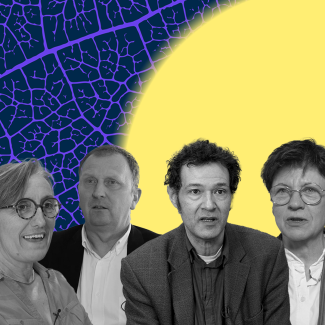
Vivatech 2022: the CNRS presents the challenges and technologies of the future
The CNRS will present an overview of its know-how in deeptech during its third participation at the Vivatech gathering in Paris from 15-18 June 2022. Visit the CNRS booth to discover how scientists and companies from or supported by laboratories from the CNRS and its partners are developing technologies of the future.
"Innovation & Prospectives": CNRS Talks
Cybersecurity, space exploration, decarbonising industry, health engineering... On 15 and 16 June, ten talks will present the state of on-going research in laboratories from the CNRS and its partners, on subjects identified as priorities in the government’s national acceleration strategies, and in keeping with the Investments for the Future Programmes. They will provide an opportunity to understand the innovative projects of the future.
Each talk will include a presentation by a CNRS scientific expert on the subject, as well as accounts from two start-ups emerging from or supported by CNRS laboratories.
Programme for Wednesday 15 June
Programme for Thursday, 16 June
Health, sustainable development, and digital technology: the start-ups present at the CNRS booth
This year at Vivatech, the CNRS has decided to feature 12 companies whose technologies emerged from basic research results, and meet the challenges of the future in the fields of health, sustainable development, and digital technology
In the field of health, visitors can learn more about the following: Aqemia, which uses artificial intelligence and quantum physics to discover new therapeutic molecules; Cardiawave, which treats heart diseases with ultrasound; Damae Medical, whose technology can detect and monitor skin cancer without a biopsy; and Genoskin, which produces human skin models to test molecules in advance of clinical trials.
Technologies relating to sustainable development will be represented by Bulane, which decarbonises industry using hydrogen combustion; Carboneo, which recycles the CO2 of companies and reduces their carbon footprint; FunCell, whose biosourced additives can reinforce paper and cardboard; and Rosi Solar, which recycles the raw materials found in the waste produced by the photovoltaic industry.
Digital technology is also a leading sector for the creation of start-ups at the CNRS: Alice&Bob designs universal, fault-tolerant quantum computers; Kayrros controls industrial infrastructure via satellite imagery; Actronika adds the sense of touch to audio or visual interfaces; and Nanomade makes any object tactile thanks to its pressure sensors made of nanoparticle ink.
Also presented, outside next to Pavilion 1: the demonstrator for Batiprint3D, which develops industrial solutions for the construction industry. The company has already built housing with its robot-printer, and offers services relating to the thermal isolation of building facades.


